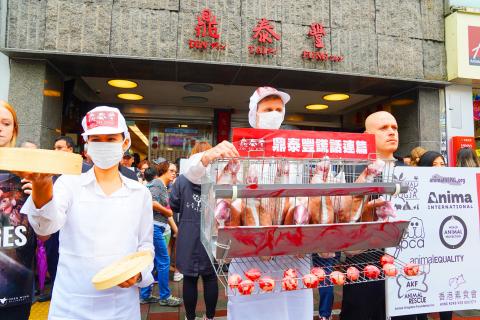Animal rights advocates on Friday protested at the branches of famed restaurant chain Din Tai Fung in Taipei’s Xinyi District (信義), urging restaurant management to curb the use of battery cage eggs.
The Environment and Animal Society of Taiwan (EAST), a member of the Open Wing Alliance (OWA) — a coalition comprised of 70 animal rights groups from 40 countries — staged the protest along with other 17 animal rights groups from 13 countries.
EAST director Chen Yu-min (陳玉敏) said that battery cage eggs are produced by hens kept in battery cages that are the size of an A4 sheet of paper.

Photo: CNA
Unlike free-range chickens, hens kept in battery cages cannot take sand baths, which allows parasites to be removed from their body, Chen said, adding that fipronil, an insecticide, must then be used because of the chickens’ inability to clean themselves.
“The European Union officially banned battery cage eggs in 2012, and Din Tai Fung’s London branch has been exclusively using free range eggs since its establishment this year,” she said.
Chen said that her organization has been attempting to communicate with Din Tai Fung in Taiwan for nearly two years, but to no avail.
Amy Odene, global corporate relations coordinator at The Humane League, said that, following a protest, US branches promised to phase out battery cage eggs by the end of this year. The original deadline was 2025.
“It was the first protest in the US, and it succeeded,” Chen said.
That victory demonstrates that Din Tai Fung headquarters understands the growing global awareness of animal welfare, she said.
If it switches to free-range eggs, Din Tai Fung could be a driver for farmers to raise chickens in a more humane way, she added.
Din Tai Fung public relations officer Wu Yi-jung (吳怡蓉) said that the brand is licensed out to overseas markets. The international branches’ management teams choose ingredients based on local cultures, needs and availability.
Wu said that eggs used by Ding Tai Fung in Taiwan are in compliance with the legal regulations set by the government.
Evaluations are still being made as to when to completely phase out the use of caged chicken eggs, she said.

A preclearance service to facilitate entry for people traveling to select airports in Japan would be available from Thursday next week to Feb. 25 at Taiwan Taoyuan International Airport, Taoyuan International Airport Corp (TIAC) said on Tuesday. The service was first made available to Taiwanese travelers throughout the winter vacation of 2024 and during the Lunar New Year holiday. In addition to flights to the Japanese cities of Hakodate, Asahikawa, Akita, Sendai, Niigata, Okayama, Takamatsu, Kumamoto and Kagoshima, the service would be available to travelers to Kobe and Oita. The service can be accessed by passengers of 15 flight routes operated by

GIVE AND TAKE: Blood demand continues to rise each year, while fewer young donors are available due to the nation’s falling birthrate, a doctor said Blood donors can redeem points earned from donations to obtain limited edition Formosan black bear travel mugs, the Kaohsiung Blood Center said yesterday, as it announced a goal of stocking 20,000 units of blood prior to the Lunar New Year. The last month of the lunar year is National Blood Donation Month, when local centers seek to stockpile blood for use during the Lunar New Year holiday. The blood demand in southern Taiwan — including Tainan and Kaohsiung, as well as Chiayi, Pingtung, Penghu and Taitung counties — is about 2,000 units per day, the center said. The donation campaign aims to boost

ENHANCING EFFICIENCY: The apron can accommodate 16 airplanes overnight at Taoyuan airport while work on the third runway continues, the transport minister said A new temporary overnight parking apron at Taiwan Taoyuan International Airport is to start operating on Friday next week to boost operational efficiency while the third runway is being constructed, the Ministry of Transportation and Communications said yesterday. The apron — one of the crucial projects in the construction of the third runway — can accommodate 16 aircraft overnight at the nation’s largest international airport, Minister of Transportation and Communications Chen Shih-kai (陳世凱) told reporters while inspecting the new facility yesterday morning. Aside from providing the airport operator with greater flexibility in aircraft parking during the third runway construction,

American climber Alex Honnold is to attempt a free climb of Taipei 101 today at 9am, with traffic closures around the skyscraper. To accommodate the climb attempt and filming, the Taipei Department of Transportation said traffic controls would be enforced around the Taipei 101 area. If weather conditions delay the climb, the restrictions would be pushed back to tomorrow. Traffic controls would be in place today from 7am to 11am around the Taipei 101 area, the department said. Songzhi Road would be fully closed in both directions between Songlian Road and Xinyi Road Sec 5, it said, adding that bidirectional traffic controls would